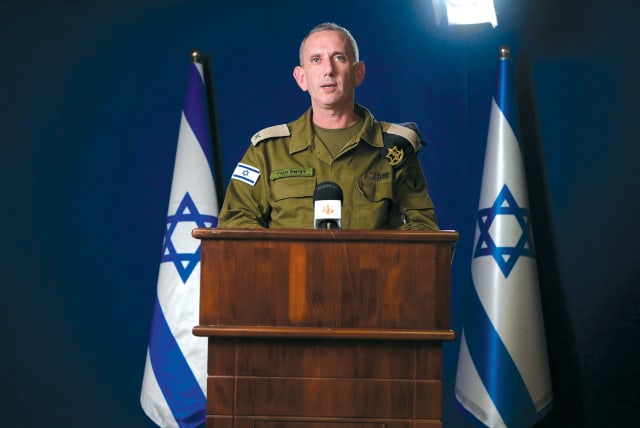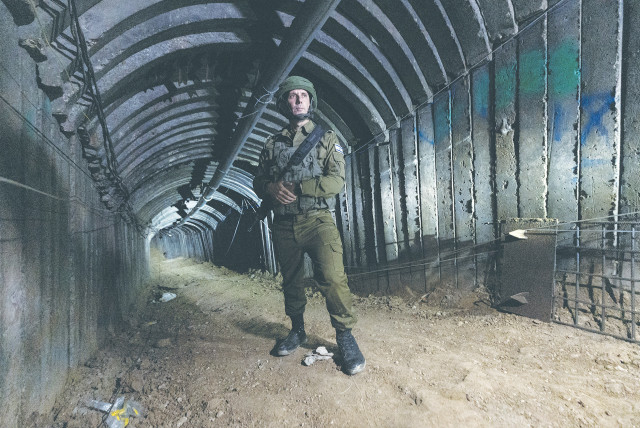Hagari: ‘No change in defense policy’ for civilians amid Iranian threat

Rocket sirens sound in South, IDF locates three-meter-deep tunnel near Philadelphi Corridor.
There is “no change in the defense policy of the Home Front Command,” IDF Spokesman R.-Adm. Daniel Hagari said on Sunday amid heightened tensions in the Middle East.
Iran has vowed to avenge the assassination of Hamas leader Ismail Haniyeh, who was killed in Tehran last week.
Hagari also spoke of the IDF’s operations in Gaza to uncover underground infrastructure and asserted Israel’s commitment to returning the hostages home.
Home Front Command OC Maj.-Gen. Rafi Milo said the IDF is determined to continue fighting until it fundamentally changes the security situation in the North and can bring the residents back home.
“We are preparing and are prepared for any scenario and any response,” he said. “In recent days, both the IDF and the Home Front Command have significantly strengthened their readiness in close cooperation, both with local authorities and with all IDF units.”
The IDF said on Sunday it located dozens of Hamas tunnel routes in the area near the Philadelphi Corridor, including one that was three meters deep. It added that troops were neutralizing the tunnel routes.
The reports of the tunnels along the corridor come more than a week after the IDF destroyed a kilometer-long tunnel in Beit Lahiya in northern Gaza.
Other reports of discovered tunnels last month include one that stored weapons underneath a bedroom where children sleep, which was found by IDF combat teams from Battalion 932 in the 401st Brigade.
The last report of tunnels located near the Philadelphi Corridor was in late May when about 20 were discovered.
The Philadelphi Corridor was taken over by the IDF in early June.
IDF statement
The IDF said on Sunday that it killed Hamas terrorist Ismail Nofal in the Nuseirat area in Gaza, who was responsible for rocket launches towards Israeli territory and who had participated in October 7.
In Deir al-Balah, the IAF struck at areas where terrorist activities were taking place, with “secondary explosions [being] identified, indicating the presence of weaponry in the area.”
In central Gaza, troops killed several terrorist cells, while in Rafah, soldiers killed several gunmen and destroyed infrastructure.
Five rockets were identified crossing from the southern Gaza Strip, the military said, triggering sirens in the Center and the South. One of the projectiles fell in the area of the Hof Ashkelon Regional Council.
Earlier, rocket sirens had sounded in areas east of Ashdod, including Bitzaron, Gan Yavne, Hatzor, Azrikam, Sde Uziyahu, and Shtulim.
Rockets have been fired from Gaza less frequently over the past few months as the IDF has destroyed much of Hamas’s terrorist infrastructure and weaponry. It has become especially rare for rockets from the Gaza Strip to be launched at central Israel.
Ashdod’s municipality opened public shelters in response to the attacks.
“This follows several alarms heard in the settlements near the city in the last hour and rockets fired at them,” it said. “This does not indicate any firing that is going to come in the direction of Ashdod, but only a precautionary measure and a safety factor depending on the situation.”
The launches came as the Iranian-led “Axis of Resistance” increased threats and attacks against the Jewish state.
In the North, multiple rocket alerts sounded after approximately 30 projectiles were identified crossing from Lebanon, most of which were intercepted by the air defenses.
One projectile landed in the area of Beit Hillel, and several fell in open areas, the IDF said.
Shortly after, the IAF struck the Hezbollah launcher from which the projectiles were sent and hit additional terrorist infrastructure in the area of Marjayoun in southern Lebanon.
Lebanese media reported the IAF attacked two locations in the al-Mahmoudiya region in southern Lebanon.
Some cities and towns where the sirens were heard included Kiryat Shmona, Metulla, Beit Hillel, Hagoshrim, and Kfar Yuval. Social media footage showed a barrage of rockets crossing into the Upper Galilee from Lebanon in the early hours of Sunday as dozens of rockets were launched at the area.
There were no reports of casualties from the barrage. However, KAN reported that a fire broke out in the moshav of Beit Hillel due to the launch.
On Saturday evening before the barrage, the Kiryat Shmona municipality told its residents to stay near safe rooms and to reduce movement in the city due to IDF military operations in the area.
The barrage comes as tension remains high between Israel and Hezbollah after Israel killed Hezbollah commander Fuad Shukr last week.
Israel’s strike on Shukr came following a Hezbollah rocket launch last Saturday, which resulted in the deaths of 12 children from the Druze town of Majdal Shams.
Jerusalem Post Store
`; document.getElementById("linkPremium").innerHTML = cont; var divWithLink = document.getElementById("premium-link"); if (divWithLink !== null && divWithLink !== 'undefined') { divWithLink.style.border = "solid 1px #cb0f3e"; divWithLink.style.textAlign = "center"; divWithLink.style.marginBottom = "15px"; divWithLink.style.marginTop = "15px"; divWithLink.style.width = "100%"; divWithLink.style.backgroundColor = "#122952"; divWithLink.style.color = "#ffffff"; divWithLink.style.lineHeight = "1.5"; } } (function (v, i) { });

